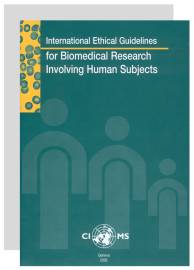The 2002 International Ethical Guidelines for Biomedical Research Involving Human Subjects superseded the 1993 Guidelines and were the third in the series of biomedical-research ethical guidelines issued by CIOMS since 1982. They were replaced by the International ethical guidelines for health-related research involving humans published by CIOMS in 2016.
The 2002 text consists of 21 guidelines with commentaries. A prefatory section outlines the historical background and the revision process, and includes an introduction, an account of earlier instruments and guidelines, a statement of ethical principles and a preamble. An Appendix lists the items to be included in the research protocol to be submitted for scientific and ethical review and clearance. Appendices include also the World Medical Association’s Declaration of Helsinki.
The Guidelines relate mainly to ethical justification and scientific validity of research; ethical review; informed consent; vulnerability of individuals, groups, communities and populations; women as research subjects; equity regarding burdens and benefits; choice of control in clinical trials; confidentiality; compensation for injury; strengthening of national or local capacity for ethical review; and obligations of sponsors to provide health-care services.
Their scope reflects the changes, the advances and the controversies that have characterized biomedical research ethics in the last two decades. Like those of 1982 and 1993, the 2002 CIOMS Guidelines are designed to be of use to countries in defining national policies on the ethics of biomedical research involving human subjects, applying ethical standards in local circumstances, and establishing or improving ethical review mechanisms. A particular aim is to reflect the conditions and the needs of low-resource countries, and the implications for multinational or transnational research in which they may be partners.


There are no reviews yet.